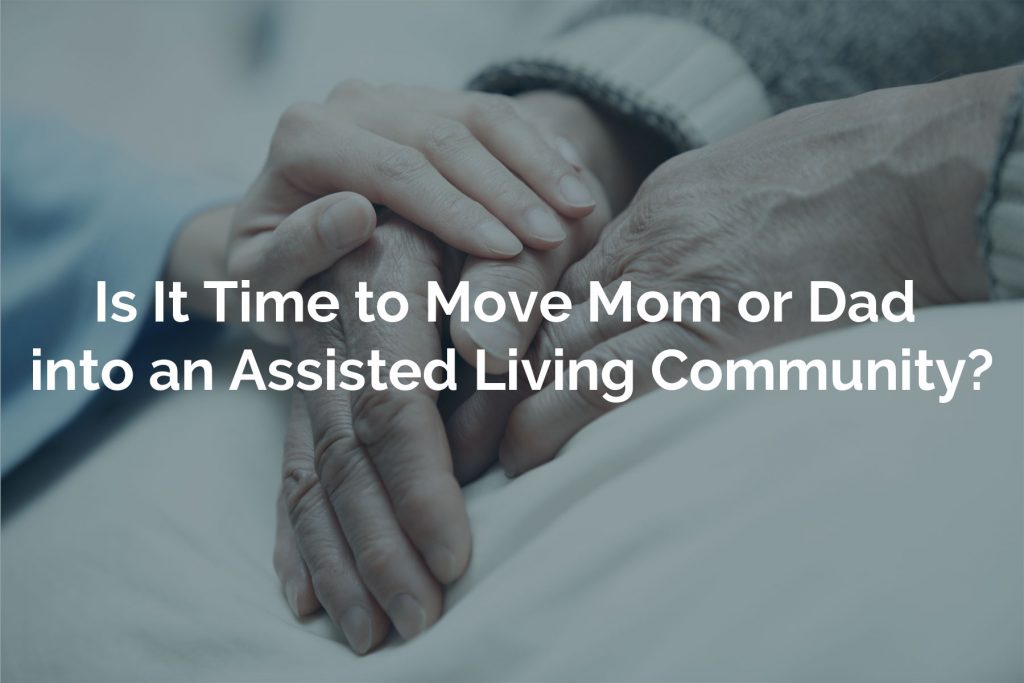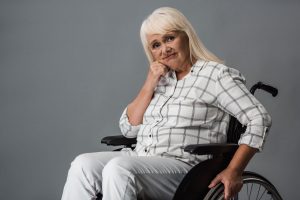
Aging is a natural part of life. We can’t stop it. All we can do is support our older loved ones so they can live as fully and comfortably as possible.
One of the most difficult decisions a child must make is deciding when it’s time to move their mother or father into an assisted living community. We want our parents to stay at home for as long as they possibly can. However, ignoring the signs can be dangerous. It’s best to ensure that your loved one receives the care and attention they need to avoid accidental injuries or illness.
How do you know when it is time to move mom or dad into an assisted living community?
- Their Care Needs Escalate
Eventually, mom or dad’s care needs may go beyond your abilities (or the abilities of whoever is responsible for them). Some children are reluctant to admit that they can no longer handle the job. That’s ok. There are licensed professionals and communities designed to provide quality care in a clean, safe environment.
You may find a care provider who can come to your parent’s location and administer treatment, therapy, or other services. This can work, but over time, their needs may become too complex to handle at home.
When that happens, it may be time to consider an assisted living community. These places have on-site doctors as well as other medical services like mobile x-rays and labs. Your loved one will never be far from the medical attention they need.
- They Are Unsafe at Home
Home is usually a safe place until medical or mobility issues start to get in the way. As parents age, they may no longer be able to navigate the places that are so familiar to them. Basic things like rugs, furniture and steps can become tripping hazards. They may have a hard time using their hands to complete simple tasks like opening a can or turning on a faucet.
If home begins to pose too many hazards, it may be time to look into assisted living. These facilities are designed with the mobility and dexterity of aging seniors in mind.
- They Can No Longer Handle ADL

ADL refers to “activities of daily living.” The term describes the basic things we do every day like eating, bathing, dressing, working, and grooming. When a parent can no longer do these things, they will require assistance.
You may be able to provide the attention they need at first, but their abilities may decline further as they grow older. An assisted living community can provide staff to help with all ADLs.
- Their Caregiver is Experiencing Stress
Caregivers can experience high levels of stress as the needs of the person they care for increase. This is something that is often ignored, especially when a friend or family member is trying to juggle their personal life while caring for someone else.
A caregiver who is dealing with stress will have a harder time keeping up with the daily demand of watching over the person who needs them. If someone else is the primary caregiver in your family, make sure you check in with them to provide support or to help them decide when it’s time to entrust their loved one to professionals.
- They Show Signs of Sundowning
Sundowners syndrome refers to agitated behavior that usually becomes worse later in the day. It is a common symptom of dementia. It can be very disruptive to daily routines and can add stress for caregivers. If your parent is sundowning, it is time to consider assisted living care.
- They Become Aggressive
Dementia can cause unusual behaviors to appear. These may be completely out of character for the patient. They may show aggression that can be physical or sexual in nature. This is not only unsafe for all involved, but it can also cause feelings of resentment among family members.
Entrusting your parent to an assisted living facility will alleviate the stress of dementia-related aggression. It also puts them in a safe place with people who are experienced with this type of behavior.
- They Are Prone to Wandering
Wandering can be deadly for an elderly individual. They can become lost, injured, or succumb to the elements. Most homes are secure from intruders, but not necessarily designed to stop a resident from leaving.
It doesn’t take long for a senior to wander. In some cases, a caregiver may step away for a few minutes and return to find their ward gone.
Assisted living facilities are equipped with proper security systems and locking mechanisms to prevent residents from leaving when they aren’t supposed to. Most have security doors that won’t allow patients to exit without the presence of an authorized staff member.
- Their Living Space is Messy
If you notice that mom or dad’s home has become messier than it used to be, this could be a sign that they are having trouble. They may not be able to keep up physically or could be experiencing depression, which can develop from feelings of isolation and loneliness.
Assisted living facilities provide housekeeping services so your loved one doesn’t have to worry about cleaning. They also create opportunities for socialization to stave off depression and help keep their spirits and self-esteem high.
- They Have Poor Hygiene
Hygiene is essential to good health. If you notice body odor, bad breath, dirty hair, or other signs that they aren’t washing properly, this can be a red flag. Your loved one may suffer from dementia or they may physically have trouble doing these tasks. It can be hard to ask for help, so be open and patient when discussing their needs and abilities.
An assisted living facility has staff on hand to bathe patients and provide the hygiene assistance they need based on their individual ability.
- They Can’t Manage Finances
Do you notice that mom or dad seems to have trouble paying bills or keeping up with their finances? This is another sign that they may be struggling and need care.
Elderly people with dementia or other conditions can have cognitive issues that make it difficult to remember or organize a budget. They are also more vulnerable to scammers who may try to obtain their bank information.
It’s best to have a trusted loved one step in and take over their finances before they potentially lose their savings, have utilities shut off, or get into debt. While they may still be able to live independently for a while, this indicates a change in ability and may be a sign that it is time for assisted living care.

Your loved one’s health and happiness is a top priority. Central Scottsdale Assisted Living is available to provide quality services provided by experienced staff. Contact us today to discuss your parent’s needs and determine if now is the time to move them into an assisted living community.
